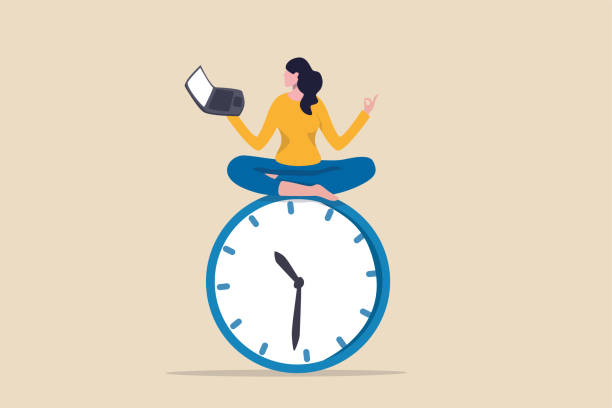The art of time management is essential for achieving a better work-life balance. Effective time management helps individuals prioritize tasks, reduce stress, and increase productivity.
We will explore strategies and techniques to help you make the most of your time, both professionally and personally. From setting clear goals and creating a schedule to delegating tasks and avoiding distractions, mastering the art of time management can have a significant impact on your overall well-being.
By implementing these principles, you can enjoy a fulfilling and balanced life, where work and personal commitments coexist harmoniously. So, let’s dive into the world of time management and discover the key to achieving a better work-life balance.

Credit: www.istockphoto.com
Benefits Of Effective Time Management
Effective time management is an invaluable skill that can significantly improve your work life balance. When you prioritize your tasks, set clear goals, and manage your time efficiently, you can experience a wide range of benefits that contribute to a more productive and less stressful work environment.
Increased Productivity
One of the primary benefits of effective time management is increased productivity. By properly allocating your time, you can focus on high-priority tasks, eliminate distractions, and work more efficiently. With a clear plan and schedule in place, you can accomplish more in less time and achieve your goals more effectively.
Here are some ways effective time management can lead to increased productivity:
- Minimizes procrastination: When you manage your time effectively, you are less likely to put off tasks or delay important projects. This helps you stay on track and prevents you from feeling overwhelmed.
- Improves focus: By prioritizing your tasks and allocating specific time slots for each, you can eliminate distractions and maintain better focus on the task at hand. This allows you to work with greater concentration and deliver high-quality results.
- Enhances efficiency: Effective time management helps you identify the most efficient ways to complete tasks. It enables you to streamline your processes, delegate tasks when necessary, and optimize your workflow. By eliminating time-wasting activities, you can accomplish more in less time.
Reduced Stress Levels
Another significant benefit of effective time management is the reduction of stress levels. When you effectively manage your time, you gain a sense of control over your workload, deadlines, and overall schedule. This control minimizes stress and helps you maintain a healthy work life balance.
Here’s how effective time management can reduce your stress levels:
- Prevents work overload: By planning and organizing your tasks, you can prevent work overload and avoid cramming everything into a limited timeframe. This prevents stress and allows you to approach your work in a more relaxed and composed manner.
- Allows time for breaks: Effective time management encourages the inclusion of regular breaks in your schedule. Taking short breaks throughout the day allows you to recharge, refocus, and rejuvenate. This prevents burnout and helps you maintain a healthy work-life balance.
- Enables better work prioritization: When you manage your time effectively, you can prioritize tasks based on their importance and deadlines. This helps you focus on the most critical tasks and reduces the pressure of dealing with multiple tasks simultaneously.
By implementing effective time management strategies, you can experience increased productivity and reduced stress levels. This combination leads to improved work-life balance, allowing you to achieve your goals while maintaining a sense of well-being and fulfillment.

Credit: royawbery.substack.com
Identifying Your Time Management Challenges
Identifying your challenges with time management is essential for achieving a better work-life balance. By recognizing the areas where you struggle, you can develop effective strategies to improve productivity and prioritize tasks more effectively.
In order to master the art of time management and achieve a better work-life balance, it is crucial to first identify the specific challenges that are standing in your way. This requires a deep analysis of your work and personal tasks as well as a clear understanding of the activities that are wasting your time. By doing so, you will gain valuable insights into how you can optimize your daily routine and make the most of your precious time.
Analyzing Your Work And Personal Tasks
When it comes to managing your time effectively, it is essential to analyze your work and personal tasks to get a comprehensive overview of your responsibilities. Start by creating a detailed list of both your professional and personal commitments, even the smallest ones. Identify which tasks require the most time and effort. This analysis will enable you to prioritize your tasks and allocate your time more efficiently.
Consider categorizing your tasks into different groups, such as high-priority work tasks, personal errands, and self-care activities. By doing so, you can easily identify which tasks are putting the most strain on your time and energy. Additionally, it helps you assess how much of your time is dedicated to work-related activities versus leisure or family time.
Determining Your Time-wasting Activities
Once you have analyzed your tasks, it’s time to determine which activities are draining your time and preventing you from achieving a better work-life balance. Identify the specific tasks or behaviors that consume an excessive amount of time without contributing significantly to your productivity or happiness.
Some common time-wasting activities include excessive social media scrolling, excessive email checking, unnecessary meetings, and multitasking. Look for patterns in your daily routine that indicate where time is being wasted. By pinpointing these activities, you can make necessary changes to eliminate or minimize them, allowing for more focused and productive use of your time.
Useful strategies to combat time-wasting activities include setting strict time limits for tasks, utilizing productivity tools and apps, and creating a structured schedule that can help you stay on track. Remember, the key is to be mindful of how you are spending your time and make conscious efforts to eliminate or reduce those activities that are not contributing positively to your productivity and work-life balance.
Effective Time Management Techniques
Discover the key to achieving a better work-life balance with effective time management techniques. Learn how to prioritize tasks, set realistic goals, and avoid common time-wasting habits. Take control of your schedule and maximize productivity in this comprehensive guide.
Time management is a crucial skill that can significantly improve your work-life balance. By mastering effective time management techniques, you can prioritize your tasks, plan and schedule your activities, and delegate tasks efficiently. This article will explore these techniques in detail to help you enhance your productivity and achieve a better work-life balance.
Prioritization
Prioritization is the key to effective time management. It involves identifying tasks in order of importance and urgency, ensuring that you focus your efforts on the most critical activities. To prioritize effectively:
- Start by understanding your goals and objectives, both short-term and long-term.
- Break down your goals into smaller, actionable tasks.
- Assign priority levels to each task based on their importance and urgency.
- Review and update your priorities regularly as new tasks arise or circumstances change.
- Focus on completing high-priority tasks first, as this will help you make progress towards your goals efficiently.
Planning And Scheduling
To effectively manage your time, it is essential to have a well-structured plan and schedule. By creating a roadmap for your tasks, you can stay organized and ensure that you allocate sufficient time for each activity. Here are some tips for planning and scheduling:
- Start by listing down all your tasks and deadlines.
- Estimate the time required to complete each task realistically.
- Allocate specific time blocks for each task in your schedule.
- Consider your energy levels and peak productivity periods when scheduling tasks.
- Set aside time for breaks and interruptions to maintain focus and avoid burnout.
- Regularly review and update your schedule as needed to accommodate unforeseen events or changes in priorities.
Delegation
Delegation is a valuable skill that can help you manage your time effectively. By entrusting tasks to others, you can free up your own time and focus on higher-priority activities. When delegating tasks, keep the following in mind:
- Identify tasks that can be delegated without compromising quality or efficiency.
- Select suitable team members or colleagues who have the necessary skills and capabilities.
- Communicate your expectations clearly, including deadlines and desired outcomes.
- Provide necessary resources and support to ensure successful task completion.
- Maintain open lines of communication and offer guidance or assistance when needed.
- Regularly follow up on delegated tasks to ensure progress and address any issues promptly.
Tips For Implementing Time Management Strategies
Improve your work-life balance with effective time management strategies. Learn practical tips to prioritize tasks, set realistic goals, and avoid common time-wasting pitfalls to optimize productivity and achieve success.
Setting Smart Goals
Setting SMART (Specific, Measurable, Achievable, Relevant, Time-bound) goals is an essential step towards effective time management. By defining clear and specific goals, you give yourself a sense of direction and purpose, increasing your productivity and ensuring your efforts are aligned with your priorities. To set SMART goals, start by identifying what you want to achieve. Make sure your goals are measurable so that you can track your progress and determine if you’ve accomplished them. Additionally, your goals should be achievable and relevant to both your personal and professional life. Remember to set deadlines for your goals, making them time-bound. This creates a sense of urgency and helps prevent procrastination. By setting SMART goals, you can prioritize tasks and allocate your time effectively, ultimately leading to a better work-life balance.Creating A Daily To-do List
Creating a daily to-do list is a practical way to stay organized, prioritize tasks, and manage your time efficiently. This simple and effective strategy ensures that you stay focused on what needs to be done and helps prevent distractions. When creating your daily to-do list, start by listing all the tasks you need to accomplish for the day. Prioritize your tasks based on their importance and deadlines. Breaking down larger tasks into smaller, more manageable subtasks can also make them less overwhelming and easier to prioritize. Consider using a productivity app or a physical planner to track your to-do list. As you complete each task, cross it off your list, providing a sense of accomplishment and motivation. Creating a daily to-do list enables you to stay organized, maintain clarity, and make the most of your time.Avoiding Multitasking
Contrary to popular belief, multitasking does not increase productivity. In fact, it can lead to decreased attention, decreased productivity, and increased stress. To manage your time effectively, it’s important to avoid multitasking and focus on one task at a time. By dedicating your full attention to a single task, you can work more efficiently and produce higher quality results. When you divide your attention among multiple tasks simultaneously, you’re more likely to make mistakes and take longer to complete each task. Avoiding multitasking also helps improve your concentration and allows you to fully immerse yourself in the task at hand. By giving each task your undivided attention, you can complete them more quickly and move on to other tasks, ultimately increasing your overall productivity. Implementing these time management strategies, such as setting SMART goals, creating a daily to-do list, and avoiding multitasking, can significantly improve your work-life balance. By effectively managing your time, you can accomplish more in less time, reduce stress, and have more time for the things that matter most to you. Take the first step today and start implementing these strategies to create a more balanced and fulfilling work-life.
Credit: medium.com
Frequently Asked Questions On The Art Of Time Management For A Better Work Life Balance
How Does Time Management Help With Work-life Balance?
Time management helps with work-life balance by allowing you to prioritize tasks effectively and allocate specific time slots for work and personal activities. This ensures that you can accomplish your work goals while also having time for leisure and family, leading to a healthier and more balanced lifestyle.
What Is The Art Of Effective Time Management?
Effective time management is the skill of efficiently organizing and prioritizing tasks to make the most of your time. It involves setting goals, creating schedules, and staying focused on important activities. By managing time effectively, you can increase productivity, reduce stress, and achieve better results in your personal and professional life.
How Can I Manage My Work-life Balance Better?
To manage work-life balance better: prioritize tasks, set boundaries, schedule breaks, delegate tasks when possible, and practice self-care.
Conclusion
Mastering the art of time management is essential for achieving a better work-life balance. Prioritizing tasks, setting realistic goals, and eliminating distractions are key strategies to enhance productivity and maximize efficiency. By consciously managing our time, we can reduce stress levels, improve overall well-being, and make the most out of both our personal and professional lives.
Take control of your time now and experience the benefits of a balanced and fulfilling lifestyle.